I attended (and spoke at) a memorial last night at NYU's Tamiment Library for Simon W. Gerson. Si, who died last December at the age of 95, was a close personal friend, a comrade in the fight for a better world and a remarkable human being. I will miss him. But more important, all people who seek a future based on human values, who cherish peace and equality, who respect the value of labor and of working people, who want a world based on sharing and caring - they will miss Si Gerson.
Si Gerson was a leader of the Communist Party and the editor, for many years, of it's newspaper, the Daily Worker (later the Daily World and People's Weekly World). He was also a committed social activist for over 70 years. He was of that generation of activists which made such huge contributions in the 30's and 40's by struggling, succesfully, for the organization of America's industrial workers, pushing through the New Deal with the creation of basic social amenities such as Social Security and unemployment insurance and achieving the defeat of fascism in World War II.
Si was married to his wife Sophie for 72 years who he met at City Colllege (CCNY) in New York in 1926. Sophie Melvin was famous in her own right: as a 19 year old organizer for the YCL (Young Communist League) she was framed for murder (along with 14 others) during the fight to organize textile workers in the deep south town of Gastonia, North Carolina in 1929. She was acquitted when a campaign for the Gastonia 15 took on world-wide propotions. Si, a cub reporter for the Daily Worker, was sent to Gastonia to cover the trial, and the two were married in 1932.
In 1937, Si was serving as the City Hall correspondent for the Daily Worker. This was the time of the Popular Front and the American Labor Party, when a coalition of progressives, including labor activists, Communists, Socialists and liberal Republicans were able to wrest control of the city from the Tammany Hall machine. Progressive Manhattan borough president Stanley Isaacs appointed Si to his staff. The tumult that resulted from the appointment of a known communist was incited by the tabloids, the Daily News and the World Telegram leading the pack. The American Legion and other right-wing groups waged a 3-year campaign but Isaacs held firm, insisting that Si was well suited and the best man for the job.
In later years Si authored the book, "Pete," a political biography that described his work managing the campaign of Peter V. Caccione, a popular community leader from Brooklyn, who became New York's first elected Communist Councilman. Si managed both of Caccione's campaigns. Another Communist, Benjamin Davis, was elected to the council from Harlem. These electoral victories were the result of proportional representation, a truly democratic voitng system that allowed minority viewpoints to be represented in elected bodies. Both council members went on to introduce and win progressive legislation in New York including rent control that committed the city to provide affordable housing to its citizens - something sorely needed today. And during this time, Si and the Communists were also active in desegrating baseball - a fight that led to the Brooklyn Dodgers' hiring of major league baseball's first African-American player, Jackie Robinson.
But the times were a changing and the victories of the 30's and 40's had aroused the ire of America's corporate aristocracy. Things were getting out of hand, they believed and thus, the era of anti-communist witch hunts, House Un-American Activities Committe (HUAC) and McCarthyism was unleashed. In New York, a city charter revision was enacted to do away with the proportional representation. Caccione led progressives in a fight to prevent its passage but PR (and democracy) lost out. Caccione died soon after and a fight ensued when Si was named by the Communists to fill his vacant post as prescribed by law. The Tammany bunch were having none of that and refused to seat him. The New York Times, in an editorial, called on the Council to obey the law and seat Si Gerson, Caccione's replacment. And an ad in the Times supporting Si's right to be seated included the names of dozens of public figures, among them the author Dashiell Hammett, attorney Arthur Garfield Hays, Congress members Leo Isaacson (D-NY), Vito Marcantonio (D-NY) and New York City union leader, Michael Quill.
Si never was seated, as Tammany used stalling tactics that continued throughout the remaining two years of Caccione's term. He did, however, run for Council in 1948 as a Communist Party and American Labor Party candidate from Brooklyn and received 150,369 votes! But PR had been abolished and Si could not be elected under the winner-take-all rules that Tammany had reinstalled.
Si's knowledge and experience of independent electoral politics was widely respected beyond the borders of his own party. He had friends and admirers from all walks of life and all points of views. Yesterday's memorial at NYU was a testament to that widespread respect. The audience was filled with family, friends and comrades and the speakers included leaders of Si's party but also beyond it from other sections of the progressive movement.
In a beautiful and fitting end to the evening, Si's daughter, Deborah, brought tears to the eyes of many of us by reading a love letter that Si had written to Sophie from the Pacific battlefields of World War II. In it, he extols his love for her and for their shared ideals. And then he quotes Russian leader Vladimir Lenin - "All my life and my strength were given to the first cause in the world - the liberation of mankind." There was no doubt that Si had lived his life in that very same way.
I knew Si through my political activism in the peace movement but also personally. Si was a customer at my camera shop and that developed into a strong friendship with him and Sophie over the years. I taught him how to use a computer so he could file his columns electronically for his beloved newspaper, the People's Weekly World, the successor of the Daily Worker.
Si Gerson's courage of conviction, his unwavering support for the struggles of working people for a just society and a better world were, to me, the model of that most decent of human being - one who cares about his fellow men and women. On a personal level, Si was modest, kind and gentle with a fine sense of humor. I will miss him very much.
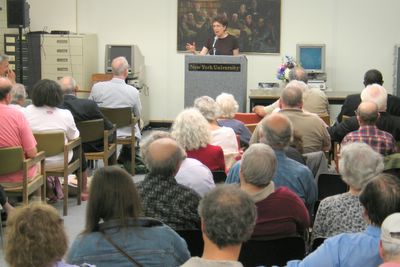
Si's daughter, Deborah Gerson, addresses the audience at NYU's Tamiment Library.

Campaign literature on display at the memorial.
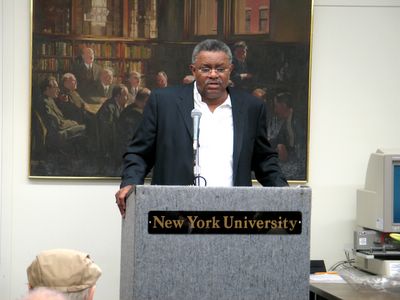
Jarvis Tyner, Executive Vice Chair of the Communist Party - "Si walked the long walk to freedom and never turned back."
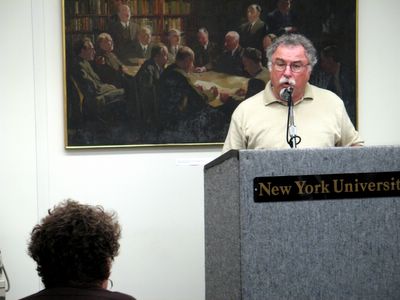
Tim Wheeler, former editor of the People Weekly World - "Si was my teacher."
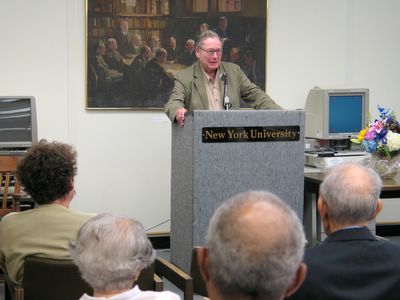
Henry Foner, former president of the Furrier's Union - "Si was a wise counselor and a tower of strength to all of us in the labor and progressive movements.”

Carol Gerson Higgs - Si's daughter-in-law: "how wonderful it was to be part of that family."
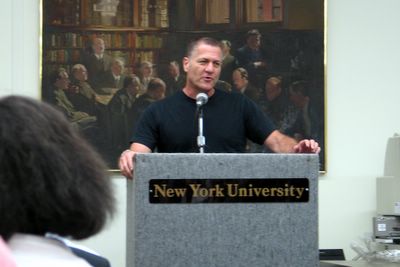
Me, Matthew, at Si's memorial - "He was a skilled practitioner in overcoming the onerous obstacles placed in the way of independent politics." - photo by Stacey Weinstein

Frank Barbaro, NY Assemblyman and judge - "Si was my guiding light."
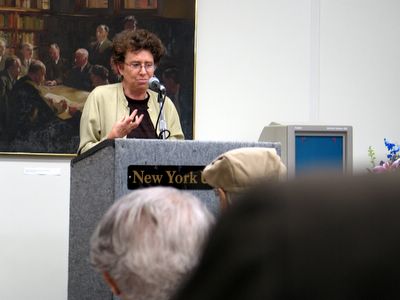
Daughter Debbie, reading from Si's WWII love letter to Sophie - "All my life and my strength were given to the liberation of mankind."

The program from last night's memorial. Aside from everything else - he was one hell of good looking guy!
2 comments:
Dear Friend: Your beautifully written accounting of last nights tribute to Si was very much appreciated. As you know I wanted to attend but "life" got in the way. So thank you . . . I almost felt as though I did attend. You do remember, don't you that my "favorite Communist" was Si Gerson? How lucky we were to have known him.
Love reading your wonderful blog. I had never heard of Si Gerson, but you have brought him alive for me. What a remarkable man.
You are right regarding corporate America. Have you ever seen The Third Man with Orson Welles?
His character sums up the approach well: our lives are reduced to dollar signs. We are seen as "marks" - consumers - not as people.
Corporate America has no interest in our hearts, minds or aspirations except in how to mine the dreams of our souls to make their marketing campaigns successful.
Regarding your blog, you have brought NYC alive for me. I will visit again to go through your "back issues."
Also love your photos and down to earth political commentary.
See my efforts at evoking compassion and conscience at Prayerforce.Org at which there is a link for my blog.
Also, I bet you would like the site Bumper Progress. Note the stickers on Social Security. I really ought to get one myself.
Post a Comment